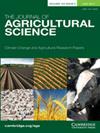Characterisation and Mapping of Soils in Major Coffee Growing Regions of Uganda
IF 2.2
4区 农林科学
Q2 AGRICULTURE, MULTIDISCIPLINARY
引用次数: 0
Abstract
There is limited information on the soil nutrient status, site specific fertilizer and agronomic recommendations for coffee in Uganda hence limiting its production and productivity. Therefore, this study was undertaken to characterize the soils under coffee farms and provide fertilizer and land management recommendations for coffee farming in selected districts in Uganda. 717 soil samples were collected from 45 coffee growing districts that were purposively selected to represent the major coffee growing regions of Eastern, Northern, Western, Mid-west and West Nile. 35 districts were sampled from Robusta coffee growing areas and 10 districts from Arabica coffee growing areas. Parameters considered in the laboratory analysis included; pH, total organic carbon, total nitrogen, available P, exchangeable Calcium (Ca), Sodium (Na), Magnesium (Mg), and Potassium (K) and micro elements: Iron (Fe), Zinc (Zn), Copper (Cu), Manganese (Mn) and Boron, soil texture, bulk density and hydraulic conductivity. Soil nutrient levels distribution maps for Robusta and Arabica coffee growing regions were generated in ArcGIS for the entire country. The soil chemical and physical properties were subjected to analysis of variance using Genstat 14th edition. The soil mapping results showed that, the overall average soil macro-nutrients concentrations were significantly different across regions (p < 0.05) with Eastern having the highest levels of macro elements (CEC of 19.28 meq/100 g, Base Saturation (BS) of 43.40%, pH of 5.78, N of 0.20%, K of 1.64 meq/100 g, P of 107.68 mg/kg and OM of 3.31%) followed by Western region. No significant difference (p > 0.05) was recorded for the micronutrients across the different regions, except Zn (p < 0.05). This study showed that Phosphorus and Potassium were generally moderate to high levels in most of the regions sampled while Nitrogen and organic matter were moderate to low. Results from this study provide a general picture of the nutrient status across all coffee growing regions in Uganda and highlight the required modifications for increased production and productivity.乌干达主要咖啡种植区土壤特性分析与绘图
有关乌干达咖啡土壤养分状况、具体施肥地点和农艺建议的信息有限,因此限制了其产量和生产率。因此,本研究旨在分析咖啡农场土壤的特征,并为乌干达选定地区的咖啡种植提供肥料和土地管理建议。从 45 个咖啡种植区收集了 717 份土壤样本,这些样本是有目的性地挑选出来的,代表了东部、北部、西部、中西部和西尼罗河等主要咖啡种植区。其中 35 个采样区来自罗布斯塔咖啡种植区,10 个采样区来自阿拉比卡咖啡种植区。实验室分析中考虑的参数包括:pH 值、总有机碳、总氮、可利用磷、可交换钙(Ca)、钠(Na)、镁(Mg)和钾(K)以及微量元素:铁(Fe)、锌(Zn)、铜(Cu)、锰(Mn)和硼、土壤质地、容重和导水率。在 ArcGIS 中生成了全国罗布斯塔和阿拉比卡咖啡种植区的土壤养分含量分布图。使用 Genstat 第 14 版对土壤化学和物理特性进行了方差分析。土壤制图结果表明,各地区土壤宏量营养元素的总体平均浓度存在显著差异(p < 0.05),东部地区的宏量元素含量最高(CEC 为 19.28 meq/100 g,碱饱和度 (BS) 为 43.40%,pH 为 5.78,氮含量为 0.20%,钾含量为 1.64 meq/100 g,磷含量为 107.68 mg/kg,OM 为 3.31%),其次是西部地区。除了锌(p < 0.05)外,不同地区的微量营养元素没有明显差异(p > 0.05)。这项研究表明,在大多数采样地区,磷和钾的含量普遍处于中等到较高水平,而氮和有机质的含量则处于中等到较低水平。这项研究的结果提供了乌干达所有咖啡种植区养分状况的总体情况,并强调了提高产量和生产率所需的调整措施。
本文章由计算机程序翻译,如有差异,请以英文原文为准。
求助全文
约1分钟内获得全文
求助全文
来源期刊

Journal of Agricultural Science
农林科学-农业综合
CiteScore
2.80
自引率
5.00%
发文量
68
审稿时长
1.4 months
期刊介绍:
The Journal of Agricultural Science publishes papers concerned with the advance of agriculture and the use of land resources throughout the world. It publishes original scientific work related to strategic and applied studies in all aspects of agricultural science and exploited species, as well as reviews of scientific topics of current agricultural relevance. Specific topics of interest include (but are not confined to): all aspects of crop and animal physiology, modelling of crop and animal systems, the scientific underpinning of agronomy and husbandry, animal welfare and behaviour, soil science, plant and animal product quality, plant and animal nutrition, engineering solutions, decision support systems, land use, environmental impacts of agriculture and forestry, impacts of climate change, rural biodiversity, experimental design and statistical analysis, and the application of new analytical and study methods (including genetic diversity and molecular biology approaches). The journal also publishes book reviews and letters. Occasional themed issues are published which have recently included centenary reviews, wheat papers and modelling animal systems.
 求助内容:
求助内容: 应助结果提醒方式:
应助结果提醒方式:


